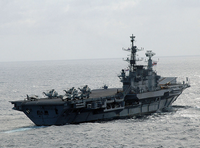Ryan Crocker’s Newsweek essay seems like a good place to start for today’s Afghanistan roundup. Using a recapitulation of the past eight years of U.S. Middle East/South Asia policy, in the context of the past 25 years of U.S. Middle East policy, Crocker comes up with not much more than the need for strategic patience in the region. Even while cautioning against expectations that what worked in Iraq will work in Afghanistan, and also while entirely ignoring some of the major errors of the past eight years that complicate the task ahead, Crocker essentially argues that we need to stay […]
South Asia Archive
Free Newsletter

Here’s a radical proposition: Withdraw from Afghanistan. That’s just what stalwart nationally syndicated columnist George Will called for on Tuesday, setting off a week of stormy debate that culminated in the secretary of defense and the chairman of the joint chiefs of staff responding to his Washington Post op-ed, titled, “Time to Leave Afghanistan.” With deliberations in Washington set to begin in earnest about a newly delivered strategy by the new commander on the ground, Gen. Stanley McChrystal, Will has opened up the most fundamental question the country faces in foreign affairs today: Should the U.S. be in Afghanistan in […]
This Thomas Rid analysis of the Afghanistan strategic debate has been making the rounds, and rightly so. It gets to the heart of why both sides of the argument are so hard to defend in a way that appeals to my Gemini nature — namely, because neither side is really wrong. Terrorism is simultaneously a global threat with local manifestations, the war against al-Qaida will simultaneously damage it while helping it attract new followers, etc. At best, the only thing we can conclude with certainty is that both approaches come with uncertain benefits and more certain costs, which leads to […]
Just to clarify a bit on this previous post, the only national security interest in preventing a Taliban victory in Afghanistan is based on the premise that if they could return things to the status quo ante, they would continue to maintain a relationship with al-Qaida. I happen to agree that this is likely if they could “win” to that degree. But I’m not sure they could actually do that, especially if we maintain support to the Afghan National Army. It could also be that the al-Qaida leadership feels safer where they are now, or elsewhere, or a decentralized combination […]
In response to George Will’s call to “offshore” the Afghanistan War, Joshua Foust makes an argument that had been buzzing around in my brain, since it presents quite a challenge to those, like Will but also like myself, who argue for an end to the U.S. military presence in Afghanistan: The trouble is, this describes Afghanistan, circa 1998-2004 or so. Itdidn’t work. In fact, I’ll take it a step further and say it actuallymade us worse off: relying solely on drones and cruise missiles to workfor us, we demonstrated we cannot assemble the necessary intelligencefor effective air strikes from satellites […]

NEW DELHI — India’s defense procurement and modernization processes are infamously slow, and mired in red tape, corruption, and lack of long-term strategic planning. One prominent result has been the country’s unsuccessful quest to either procure aircraft carriers internationally or build them at home. The delays have forced India to refit its sole aircraft carrier — the 50-year-old INS Viraat, which according to earlier plans should have been junked by now — to operate for five more years, by which time India hopes to have procured more. The irony is that, over time, Viraat’s air fleet has also been substantially […]
